By Liz Timbs and Peter Alegi
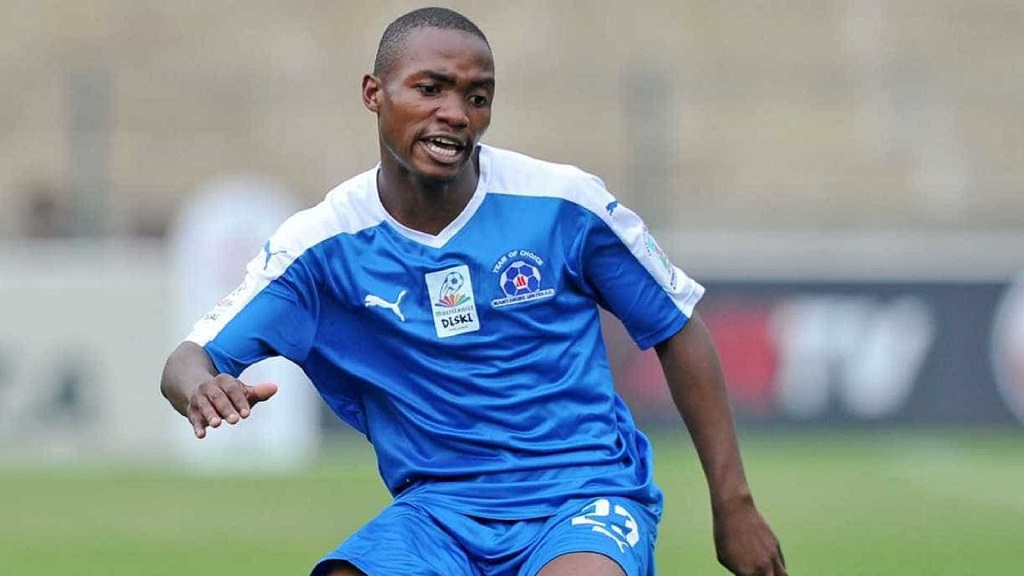
Tragically, on May 4, 2018, 21-year-old striker Luyanda Ntshangase passed away, two months after being struck by lightning during a Maritzburg United friendly. Football Is Coming Home extends our most heartfelt condolences to the Ntshangase family.
The funeral service will take place at Alan Paton Hall, Maritzburg College, Princess Margaret Drive, Thursday, May 10, at 10am.
Listen to Luyanda’s 2016 interview with Liz Timbs, in which he spoke matter-of-factly and powerfully about what mattered to him most in life and football, his hopes and dreams for the future.
At this time of sadness and grief, it is important to hear his passion, focus, and dedication to the game. Not only have Pietermaritzburg and South Africa lost a talented striker, but also a young man of great character and boundless promise.
Hamba kahle, Luyanda!
Tag: Pietermaritzburg
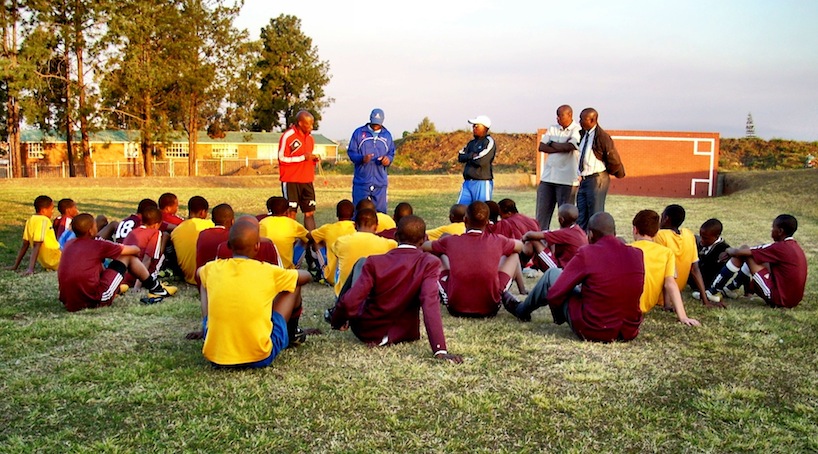
Guest Post by *Liz Timbs
In August 2013, I had the privilege of spending three days with the Izichwe Football Club in Pietermaritzburg, capital of South Africa’s KwaZulu-Natal province. During my brief stay, I observed training sessions, visited players’ high schools, and interviewed some of the young men and coaches. The quotes below come from these conversations.
Every weekday afternoon at the University of KwaZulu-Natal campus in Pietermaritzburg, two dozen 10th grade-boys come together on a humble football pitch to hone their skills at Izichwe Football Club. Established in 2010 and named after the first military regiment (ibutho) commanded by Shaka Zulu, the club is “not just about kicking a ball,” says Thabo Dladla, founding director of Izichwe and Director of Soccer at UKZN. It is also about developing young men of character and respect who represent their communities and themselves with pride and honor.
Respect (inhlonipho in the Zulu language) and discipline (inkuliso) are core values at Izichwe as they are in Zulu culture more broadly. The coaches refer to the teenagers as amadoda (umarried young men) and even baba (father) to stress the importance of carrying themselves in a mature way on and off the pitch.
These two dozen high school boys at Izichwe embody the values and lessons imparted to them by their coaches, especially Thabo’s emphasis on showing self-respect as much as respect for others. When I spoke with the youngsters, they politely thanked me for coming to Pietermaritzburg to meet them and spoke with poise beyond their years.
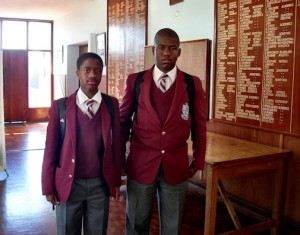 “The program is not only about sports or soccer. It’s mostly about life,” Asanda tells me. Izichwe is “about respecting the people you are around, and playing fair, which applies in life. You do it the right way. Don’t cheat. Don’t cheat yourself.” Similarly, Simphiwe stated, without hesitation, that Izichwe had taught him “to work hard in life and to respect your instructors.” Asanda and Simphiwe’s statements were echoed in a team meeting I observed. Technical director Mhlanga Madondo, a police officer, entreated the players to look at their performances in the previous weekend’s tournament, stating that he expected them to “take responsibility for their own growth.”
“The program is not only about sports or soccer. It’s mostly about life,” Asanda tells me. Izichwe is “about respecting the people you are around, and playing fair, which applies in life. You do it the right way. Don’t cheat. Don’t cheat yourself.” Similarly, Simphiwe stated, without hesitation, that Izichwe had taught him “to work hard in life and to respect your instructors.” Asanda and Simphiwe’s statements were echoed in a team meeting I observed. Technical director Mhlanga Madondo, a police officer, entreated the players to look at their performances in the previous weekend’s tournament, stating that he expected them to “take responsibility for their own growth.”
Hard work is another crucial component of the Izichwe way. When I asked Lindi what the program had given him, he said, simply: “discipline.” Every day, without exception, the boys make their way to the university sports fields to train from 3:30p.m. to 5:30p.m. Many of the boys also play for their school teams at least one day a week (with one boy competing in cross country events in addition to playing school soccer). Saturday is match day in a local amateur league. Sundays are reserved for tournaments. This intense, demanding schedule instills in the boys not only physical endurance and strength, but mental acuity as well. Dladla believes this constant pressure shows the dedication and perseverance of his players. “Boys like Siphesehle (the cross country runner), he’s very, very competitive, you know? He did cross country; he came [to training], and I said, “Hey! You rest!” He said, “No, coach! I came to train!”
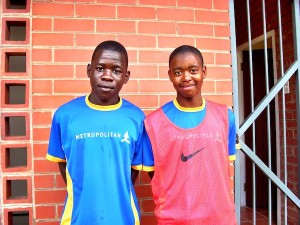 Although the players’ development as athletes is central to the program, Thabo, a former teacher and ex-professional footballer, regularly reminds players that “nothing in this life is as important as knowledge.” As a result, the program integrates numerous educational programs into their activities. Every night at the conclusion of practice, around 5:30, a group of the players gathers in a classroom on campus to study under the supervision of volunteer university students.
Although the players’ development as athletes is central to the program, Thabo, a former teacher and ex-professional footballer, regularly reminds players that “nothing in this life is as important as knowledge.” As a result, the program integrates numerous educational programs into their activities. Every night at the conclusion of practice, around 5:30, a group of the players gathers in a classroom on campus to study under the supervision of volunteer university students.
The coaches closely monitor individuals’ academic performance by reviewing school progress reports. This scrutiny, one parent explained, helps to “notice any hiccups in their progress at school.” In the opinion of Devon, the life sciences teacher at Alexandra High School, which several Izichwe boys attend, such devoted attention to player’s academics is unusual when compared with many other students who lack such careful supervision. “It’s a structured lifestyle which, I think, is lacking in a lot of our schools,” Devon explained. “I think that’s partly why these boys are so successful. They grow and they excel in every area.”
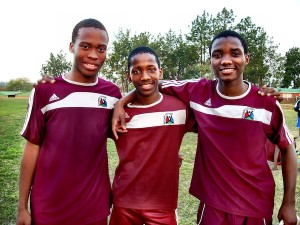 The youngsters openly expressed their gratitude to the adults who put precious time, energy, and resources into the program. “There are many kids out there who want this opportunity and we are very special to get that,” Mpumelelo said. Sandile stated unequivocally that the program has “changed the most part of my life.” Keelyn agreed, and without hesitation added that thanks to Izichwe, “I found myself.” Sandile spoke passionately about his appreciation for Izichwe: “Basically, what this program means to me is that it gives me the opportunity to realize a dream that I never thought . . . it was never something I believed I’d be able to do . . . it just made me realize, if I continue working hard enough, I can be one of the best players in the world.”
The youngsters openly expressed their gratitude to the adults who put precious time, energy, and resources into the program. “There are many kids out there who want this opportunity and we are very special to get that,” Mpumelelo said. Sandile stated unequivocally that the program has “changed the most part of my life.” Keelyn agreed, and without hesitation added that thanks to Izichwe, “I found myself.” Sandile spoke passionately about his appreciation for Izichwe: “Basically, what this program means to me is that it gives me the opportunity to realize a dream that I never thought . . . it was never something I believed I’d be able to do . . . it just made me realize, if I continue working hard enough, I can be one of the best players in the world.”
The Izichwe coaches are also grateful to be part of this project. Coach Madondo said that working with these young men has inspired him; he’s seen them “not just growing physically, but also [in] how to approach life.” Coach Ronnie “Reese” Chetty, who had a long coaching career including experiences in the United States, told me he is reinvigorated by the hard work and dedication these young men exhibit on a daily basis. The coaches are also driven and guided by the hardships, struggles, and perseverance of some of the players and families.
“It’s people like Sipesehle and Mhlengi’s mothers who sometimes give me lots of motivation when I see how hard they try, you know?” explained Thabo Dladla. “So then, I say: ‘Hey man! I cannot give up. I cannot let them down. So let me try and help them develop real men,’ you know?”
And from what I saw these Izichwe boys are becoming real men of immense diligence, humility, discipline, and respect. And, perhaps even more so, this community of boys, men, and parents demonstrates the great potential for grassroots soccer programs to fuel the development of not only athletic talent with a bright future in sport, but also of productive citizens in a democratic society.
—
*Liz Timbs is a PhD student in African history at Michigan State University. Her research interests are in the history of health and healing in South Africa; the professionalization of medicine; masculinity studies; and comparative studies between South Africa and the United States. Follow her on Twitter: @tizlimbs
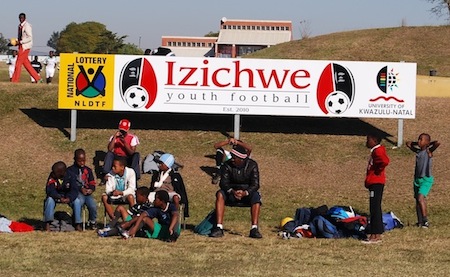
In the wake of Pitso Mosimane’s firing as Bafana Bafana head coach, there seems to be general agreement in South African football circles that a plan is needed to develop the local game constructively and sustainably.
On this blog, Mohlomi Maubane recently argued in favor of a German model that synchronizes the interests of the FA, the national team, and of professional clubs. “It is by virtue of young players being trained well that the German national team, and any other national team, can realise its full potential,” added Ted Dumitru and Sipho “King K” Kekana over at maximalfootball.com. “Lack of technical education in this vital aspect made many nations, including SA, compete without an identity and the results have been disastrous,” the two experts point out.
On June 9-10, 2012, the national finals of the under 15 boys’ Manchester United Premier Cup provided some clues about what lies ahead for South African football. At the Nike Football Training Centre in Klipspruit, Soweto, Ajax defeated SuperSport United in the final (2-1) to qualify for the global finals in China in July. The rest of the field featured Orlando Pirates, Izichwe FC, Bidvest Wits, School of Excellence, Diambars, and Mamelodi Sundowns.
According to observers’ accounts, most teams at the Premier Cup fielded sides of tall, strong boys indulging in well-rehearsed kick-and-rush football. Two exceptions stood out: Izichwe FC and School of Excellence. The case of Izichwe, an extraordinary program based at the University of KwaZulu-Natal in Pietermaritzburg, illustrates how making highly technical footballers out of promising teenagers requires not only financial resources and qualified coaches, but also time and patience.
Izichwe distinguishes itself in a number of ways from the vast majority of youth programs in South Africa and elsewhere on the continent. Founded in 2010, when my family had the privilege of being welcomed into the Izichwe clan, the academy got its name from the regiment (ibutho) of Shaka kaSenzangakhona, the founder of the Zulu kingdom. It operates on a shoestring budget compared to the PSL youth teams in the Premier Cup. It is a not-for-profit organization in which the parents and sponsors — both local and international — actively participate in shaping the sporting and educational development of each youngster.
After intense daily training sessions, the Izichwe boys, many of whom come from humble backgrounds, remain on the University of KwaZulu-Natal campus for a meal and to complete their homework before returning home for the night. Developing responsible citizens is considered just as important as training future members of Bafana Bafana. From a football standpoint, Thabo Dladla, Izichwe’s technical director, points out that while Izichwe coaches understand the importance of the team their priority is individual development. The coaching staff works assiduously to develop the technical, tactical, psychological, physical and emotional aspects of the boys’ game. Another important aspect of the Izichwe approach is the lack of an overbearing, ambitious owner, the kind of person who regularly exerts pressure on coaches and players to deliver trophies and obey the dictatorship of results.
For Bafana Bafana to improve, the quality of play in the Premier Soccer League — the richest league in Africa — must improve; but this cannot happen if football development programs fail to provide players under the age of 16 with the multiple skills required for successful professional careers. Izichwe shows the way forward. As we say in isiZulu: “Phambili!”.
2010 was the year of Africa’s first World Cup, a historic year for South Africa and for the continent. An hour west of Durban’s huge Moses Mabhida Stadium, in the KwaZulu-Natal hills, every weekday afternoon 46 boys train on a modest football ground at the University of KwaZulu-Natal in Pietermaritzburg. These 13-year olds symbolize the immense potential of grassroots football in South Africa.
In an atmosphere of quiet industriousness and positive support, the boys of the Izichwe Youth Football programme go through fitness routines, refine individual skills, and play small-sided games under the watchful eye of several local coaches.
Named after the regiment commanded by Shaka Zulu two centuries ago, Izichwe is a not-for-profit development program providing access to high-level football training and life skills instruction to black youth from the Pietermaritzburg area. Working on a shoestring budget, it helps to overcome enduring barriers to participation in sport for black youth in a democratic South Africa.
It has been an honor and a privilege for me to be part of Izichwe while a Fulbright Scholar at the University of KwaZulu-Natal. I am grateful to Thabo Dladla, Izichwe’s founding director, for warmly welcoming my family into this wonderful sporting community. One of my daughters joined Izichwe–the only girl and the youngest player by three years.
As our involvement with the program intensified, I realized that I had come full circle from my first visit to South Africa in 1993 as a young volunteer sports coach in Khayelitsha, a massive black township on the outskirts of Cape Town. Now I was here with my entire family and I got to rekindle and sharpen my coaching inclinations. I also gave occasional classroom lectures to the youngsters, prepared them for an oral history project, and helped with the year-end function (see video above).
There is something very special about Izichwe. Thabo Dladla, Mhlanga Madondo, “Styles” Mkhize, Patrick “Cutter” Mthembu, Xolani Madlala, Ronnie Chetty and Kristen Konkol provide specialized coaching and caring, constructive leadership. Their positive, non-authoritarian approach aims at unleashing the boys’ potential on and off the football pitch.
Izichwe’s approach is not so much about winning games and tournaments, but about teaching technical, tactical, psychological and physical skills that will serve the teenagers well down the road. This long-term vision of achievement can be tough on the boys. I have seen them lose against teams stacked with over-age players. A few years down the road it will be interesting to compare the achievements of the Izichwe boys with those of the over-age players.
To understand Izichwe is to appreciate how football is closely linked to the physical, intellectual and social growth and development of historically disadvantaged South African youth. Most players come from tough socio-economic circumstances and at Izichwe they learn sport’s values of teamwork, hard work, discipline, and achievement. The daily training routines provide needed structure to these student-athletes’ lives. In many cases, I have seen individuals acquire confidence, strengthen their self-esteem and self-awareness, and even improve their academic performance.
Next year I hope that a girls’ team will be up and running at Izichwe. It is important that the same opportunities offered to boys are also made available to girls. I am confident that a few years from now, many Izichwe veterans—male and female—will be representing their country and competing in top leagues. For those individuals who will opt for a career in something other than football, Izichwe will have empowered them with skills, knowledge and experience to become good citizens and community builders.
As I prepare to leave South Africa in a few days, I want to take this opportunity to thank my fellow coaches and the players at Izichwe. Their warmth, generosity and brotherhood will never be forgotten. This moving experience has reminded me of a German theologian’s response to a question about how to explain happiness to a child: “I wouldn’t explain it,” Dorothee Solle said; “I’d toss him a ball and let him play.”
What’s in a shoe?
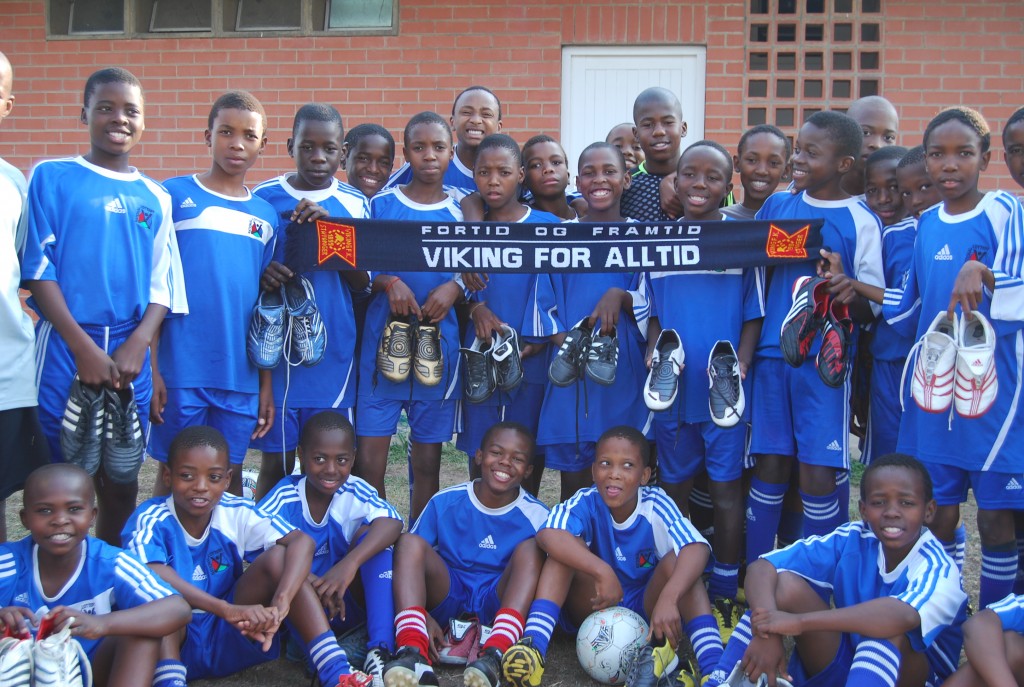
From black high-cut steel-toe boots with leather studs to light, laceless pink boots with titanium studs, the history of football shoes is a journey from pain to pleasure.
Outside Europe and North America, however, millions of young players from working poor families cannot experience that special feeling of slipping on a fine pair of ‘real’ football boots. That is why this week’s generous gift of high quality boots from Viking Stavanger FC in Norway brought such joy to the boys of the Izichwe Youth Football program in Pietermaritzburg, KwaZulu-Natal.
Izichwe has also been invited to Norway for a major international tournament in May 2011. The solidarity of Viking (est. 1899) is doing a lot to open up opportunities for this terrific group of young South Africans.